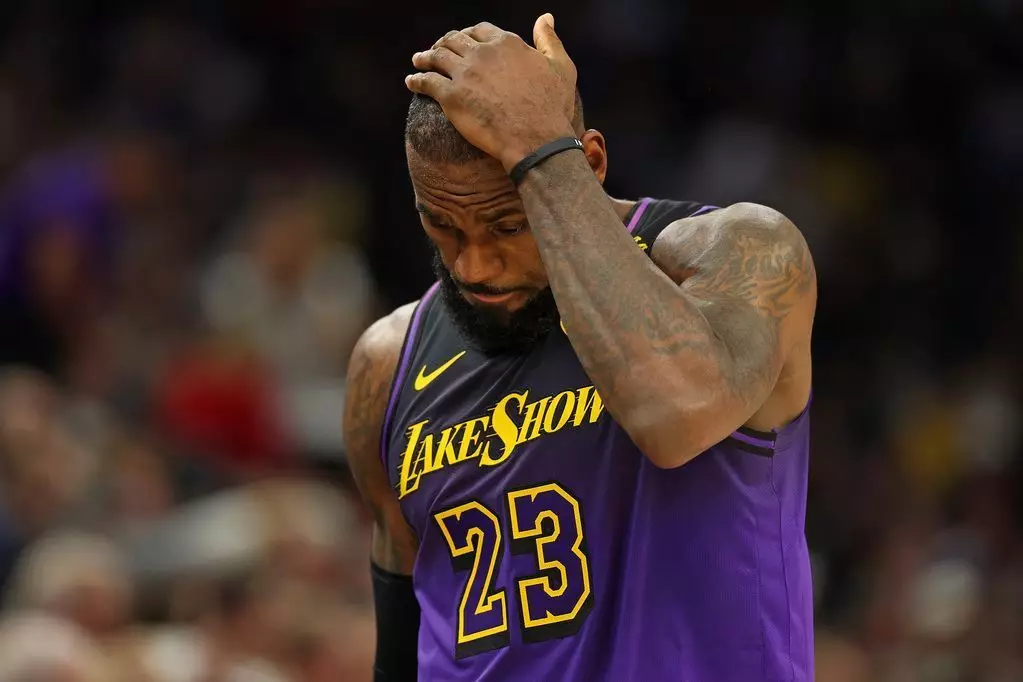The Los Angeles Lakers currently find themselves in a precarious situation as they navigate the complexities of their veteran star LeBron James’ performance amid a notable shooting slump. With aspirations to compete at the highest level this season, the Lakers are grappling with how to best manage James’ role while ensuring the overall success of the team.
James recently tied his season low, scoring just 10 points in a disheartening 109-80 loss to the Minnesota Timberwolves. His struggles were epitomized by a dismal shooting performance, where he connected on only 25% of his attempts, including an alarming 0-for-4 from three-point range. Over the last four games, James has failed to make a single three-pointer, logging an unprecedented 0-for-19 performance from beyond the arc. This kind of shooting inefficiency is particularly concerning, as it mirrors his worst stretch since a similar drought during his rookie year in 2004. The expectations placed on James, who is approaching his 40th birthday, heighten the stakes and bring into question the wisdom of pursuing a full 82-game schedule.
James himself has acknowledged his frustrations, citing rhythm as a critical issue affecting his game. After three consecutive games under 45% shooting, he is acutely aware that his performance has faltered compared to earlier in his career. “Work. Just work. That’s all,” he stated about regaining his shooting touch. His commitment to hard work is commendable; however, the inquiry remains: can he genuinely sustain this intensity while sidestepping potential injuries as the season progresses?
Lakers coach JJ Redick has emerged as a vital voice in this conversation, expressing caution regarding James’ goal of participating in all 82 games. Redick emphasized the need to prioritize James’ health and performance quality over mere quantity. The observations from the Lakers’ locker room suggest that the team’s dynamic is off-kilter. With James averaging six turnovers during the recent loss and possessing the worst plus-minus on the team for the season, the indicators point to deeper systemic issues affecting the entire squad.
Further complicating matters, Anthony Davis reported that players are not effectively spacing themselves, leading to overcrowded offensive plays. This congestion disrupts the team’s flow, contributing to inefficient scoring and a tendency to look disjointed—a stark contrast to their early-season promise. “We got to get back into our spacing,” Davis remarked, underscoring the need for the team to recalibrate and return to fundamental principles of basketball strategy.
As they find themselves with a lackluster record of 12-9, currently sitting eighth in the competitive Western Conference, the Lakers’ trajectory illustrates inconsistency that may thwart their playoff aspirations. The team has lost five of their last seven games, culminating in the franchise’s lowest scoring output since 2017. Such defeats not only embolden critics but also ignite internal reflections about the team’s identity. Redick has duly characterized the season thus far as “uneven and inconsistent,” which resonates with the sentiments echoed by James and Davis.
LeBron and Davis’ declarations speak volumes about the duality of their potential. At times, they exhibit the prowess necessary to contend against the best teams; however, they simultaneously showcase vulnerabilities that raise alarms about their championship caliber. Davis poignantly noted the need for the team to unify around a consistent identity: “Sometimes we look like a competitive team; sometimes we look terrible.”
With a quarter of the season completed, the Lakers must reflect on their strategies moving forward. It is pivotal for the coaching staff and players to engage in honest conversations about their state. A renewed focus on spacing might yield dividends in offensive execution, allowing talented players like James and Davis to thrive. It is equally essential for LeBron to acknowledge the ongoing ebb and flow of his game; this humility could pave the way for a more balanced and sustainable approach to the season.
As Los Angeles grapples with its identity, the solution lies in blending perseverance with adaptability. By prioritizing team dynamics, fostering effective communication, and addressing individual performance challenges, the Lakers can recalibrate and harness their potential as the campaign progresses. The road ahead is fraught with obstacles, but with focus and commitment, the storied franchise can find a way back to a competitive stance in the league.

